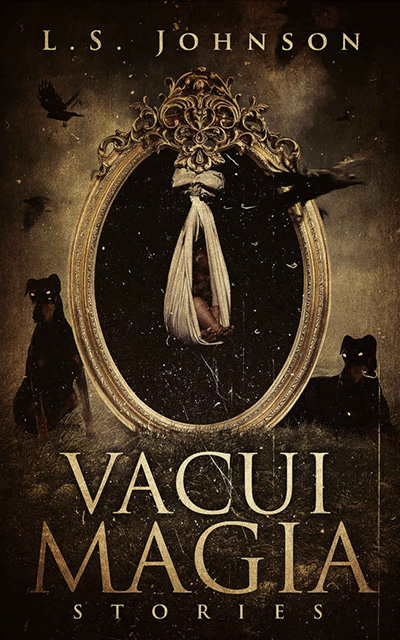 Vacui Magia
Vacui Magia
 Critique by Ellen LaFleche
Critique by Ellen LaFleche
The writing in L.S. Johnson's winning collection of short horror stories, Vacui Magia, is beautifully lyrical and metaphorical. The stories blur in psychologically imaginative ways the boundary between horror and fantasy. The protagonists are women in a variety of challenging situations; the magical twists in each story provide the reader with horror-story chills while shedding light on the social, political and emotional aspects of these women's lives.
The opening story, "Little Men with Knives", is the strongest in this collection. This modern retelling of the Snow White story explores the life of a middle-aged woman trapped in practical and emotional dimensions. The plot is scarily hallucinatory, reflecting the psychological splitting of a woman trapped in a very oppressive situation. Not only does she work at a dreary, low-paying job, but at night has to overhear a female neighbor being abused by her husband. This deceptively simple paragraph about her cafeteria job foreshadows the horrors to come:
Today I'm salad; Ethel, who is too old for this but has no savings, is drinks... Lunch lasts for two and a half hours—the classes are staggered—then there's two hours for cleanup. Al, who's been here the longest, says that there used to be more time at both ends and we would work special events, too, but budget cuts scaled everything back. Now the special events are catered by a company from the city and we get just enough hours to get by, just enough benefits to keep us hanging on.
Here, Johnson skillfully describes the cafeteria while adding a bit of spooky unreality: "Today I'm salad; Ethel, who is too old for this but has no savings, is drinks."
While I enjoyed each story, I feel that they could have been more cohesive as a collection. The ones in ordinary settings, such as the school cafeteria in the opening story, were more successful than those in more magical settings, such as the weird forest in "Germinant". The first two stories feature women grappling with concrete issues such as work and the loss of a child, but the third story, "The Pursuit of the Whole is Called Love", felt like a sudden departure from the emerging theme. While I enjoyed this innovative piece about a shape- and gender-shifting couple, I was a bit jarred by the change in theme, style and tone. For example, the dialogue in "Little Men with Knives" was signalled with traditional quotes while dialogue in "The Pursuit of the Whole is Called Love" was signalled with hyphens. I kept wondering why the author made these choices, which distracted me from the overall enjoyment of the book. A better strategy might have been to break up the stories into two or more sections that would prepare the reader for the abrupt changes in style and theme.
I appreciated the lack of proofing errors and the overall aesthetics of the book, including size and font choice. This author deserves a larger readership and the book would be a pleasure even for readers who are not fans of the horror genre.
Excerpt from Vacui Magia by L.S. Johnson on Scribd








